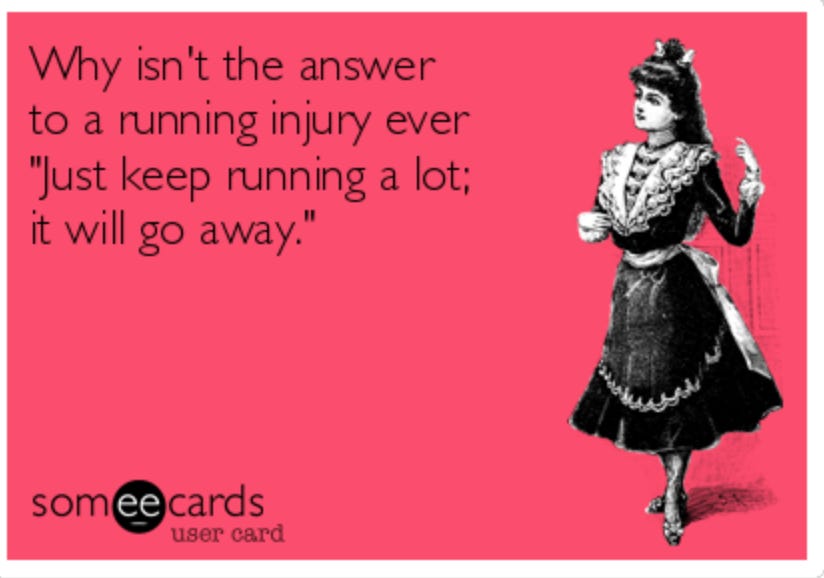LOLZLetter 225 | Rest Weeks? Why Bother?
Welcome,
I hope you had an enjoyable Memorial Day weekend. Let us not forget the meaning of Memorial Day and those who sacrificed everything for our freedom. It's not a "happy" holiday, but I hope you had a safe and enjoyable (long) weekend.
A tiny house cleaning: I'm bringing back the running-as-you-age series. In case you missed it, I ran a series about how runners deal with aging last May. From the 30s up to, well, as high as we can find. All I’m looking for are people who are willing to share their stories about how running has changed and what they do differently since getting older. Maybe even a photo or two if you are feeling generous.
So if you know someone who would like to talk about their experience getting older and still running, have them email fueledbylolz@gmail.com with the subject running as you age series (even if that person is YOU).
Onto the Newsletter:
This week is about down/rest/recovery weeks. I was inspired by my own week of running. I realized on Wednesday that I had zero motivation to run in 30 mph winds. I also hadn't had a down week in too long. So last week was that. Then I was rewarded today with my fastest 5k in about two years.
We know running and gaining fitness is a balance between stressing your body and then recovering. If you don't recover, you won't utilize the gains from the stress. One rest day is often insufficient; we need a week or more to recover.
Why are rest weeks good?
If you don't recover enough, you won't get any faster. But rest weeks aren't just the psychological gains, but the mental gains too. Reducing your weekly mileage will help prevent injury by allowing your body to repair damaged tissue.
Mentally, rest will enable you to shake off a rough or tough training week. The latter was essential for me too. Last week I began to feel stagnant. Getting out the door felt challenging every time.
Rest Weeks and Bone Injuries:
One of the more severe injuries a runner can have is a bone injury (like a stress reaction or fracture). Bone responds to stress by getting stronger (so yes, weight-bearing activities like running or weight lifting help prevent osteoporosis and give you strong bonwes). But, like anything, there is a fine line. Too much stress on the bones causes injury.
During the first few weeks of the bone remodeling process, your bones are weaker! That's why when you break a bone, you shouldn't run on it for 6-8 weeks (or more). The first five or so weeks, your bones are weaker and more likely to rebreak.
Rest weeks are helpful to prevent bone injuries because taking a rest week every 3-5 weeks allows your body to recover and get stronger. Runners are most susceptible to stress fractures around 3-4 weeks after starting a new program. Whether that means starting to run or starting a new workout regimen. By taking a rest week, you are allowing your body to recover instead of breaking down.
But down weeks aren't just good to help prevent stress fractures.
How Much Should You Cut Back During Your Running Rest Week?
Again, there is no right or wrong answer. Most recovery weeks cut back anywhere between 25-50% of weekly mileage or 50-90% of the highest mileage weeks. Decreasing by 10-15% might not be enough to see the benefits of a rest week.
There are some rest weeks; I might reduce the number of days per week I run. For other runs, I cut the miles per week. Usually, I spend a week doing primarily easy runs or maybe even some short cross-training. Either way, I run less and take more rest and recovery.
Last week I added two rest days and removed my double and long run. My intensity actually went way down as well because I enjoy running 9:30-10 minute miles on the treadmill (as opposed to around 9-9:30 outdoors).
Recovery weeks are essential during marathon training or big races. If you follow a training plan or have a running coach, you should make sure it includes recovery weeks.
How Can Running Rest Weeks Prevent Mental Burnout?
Let’s face it, at some point, most runners “burn out.” You can't be "go go go" all of the time. Ideally, sure, but most of us work a job or have other running responsibilities that running can't (and shouldn't) be our whole life.
A personal story: My (first) burnout came shortly before I got injured...with what do you know, a stress fracture.
I tried to push through the fatigue, but looking back, my body told me to rest. I should have taken a down week or even a week entirely off to mentally and physically recover, but I didn't and tried to push through those feelings. Then I was forced to take eight weeks off with a serious injury.
So how can rest weeks help prevent mental burnout?
Absence makes the heart grow stronger...right? The time away from the sport is going to help mental recovery. Most runners benefit from time out, not worrying about when you'll run, sleeping in, and doing things you cannot normally do when you are training. Being disciplined during training is easier when you aren't doing that year-round.
Anyway, most people probably already know this. Maybe it's a reminder to you.
What is Keeping Me Entertained?
Saucony Kinvara 14 Shoe Review
La Jolla Half Marathon (1:37.43)
NORTIV 8 Women’s Waterproof Hiking Boots Review
Factor Meals Review (Update for 2023)
96-year-old breaks world record at Ottawa Race Weekend
Kara Goucher’s Book Offers Rare Insight Into Elite Athlete Contracts
Katie's Gettysburg Marathon Experience: I really enjoyed talking to Katie the last few months as she trained for her first marathon: Gettysburg
My Run Club Was Profiled for ‘Cheering While Black’—Here’s Why It Only Reaffirms Our Mission
Sales from Memorial Day:
Rabbit has 40% of their clearance—one of their best sales of the year.
Tifosi sunglasses are 25% off! I love mine. Many of their styles start at $25 and they are more scratch resistant than other brands I've tried. Plus they don't bounce when running.
You Can Follow me on:





